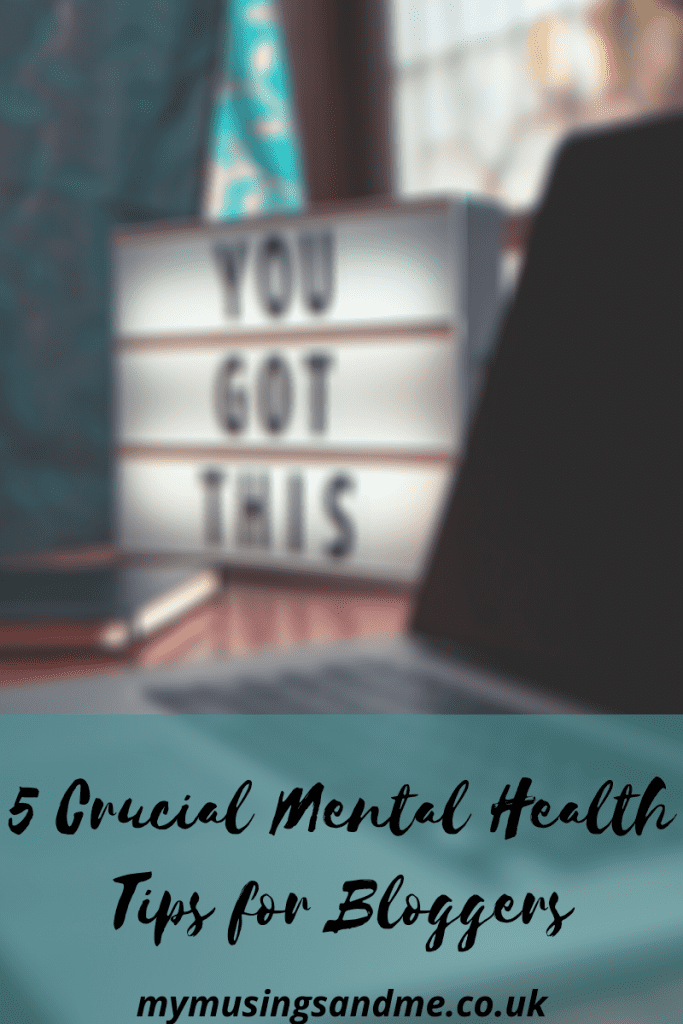
Being a blogger comes with its own unique challenges. So it’s crucial we look after our mental health. If you’re reading this, it’s likely you know what I’m talking about. And yet, the challenges we face and the reasons we blog may be different. According to GrowthBadger, there are over 600 million blogs. And people search for “how to start a blog” 121,000 times a month on Google.
So, there’s a lot of us out there sharing the joys but also the trials and tribulations associated with starting and, more importantly, maintaining a blog. However, we feel about our blog, and this may fluctuate, there are times when blogging takes it’s toll. With this in mind, we need to keep an eye on our mental health as we undertake this journey.
Whilst physical acts of self-care (more here) are part of the picture to boost our energy, motivation and productivity. There are other, more blogger specific things to consider:
1. Be Your Own Self-Editor
Self-editing means thinking about what we share before we share it. The sharing of personal experiences can be a powerful contribution to any discussion. Making them diverse and interesting. And adding to learning and helping us understand a perspective we may not hear often.
Many mental health bloggers started with these goals and a lived experience in mind. It’s a phenomenal gift to share your experience to help others. Whether by sharing tips or contributing to overall education and battling stigma. But we do need to be aware of our mental health and make an informed choice about what we share in the public domain.
A key question to ask ourselves is how will we feel about sharing this personal part of our lives? And how may our audience feel when they read it? We need to be aware of our vulnerabilities and those of others. So, before clicking ‘publish’ check in with yourself. In a few days, a week or a month how will I feel about this post? And is there anyone I wouldn’t want to read it? And then there’s the comments. If they’re not what I expected how will I cope and do I have a support network to rely on?
We should also give our audience some thought. We wouldn’t want to make someone else vulnerable. Think about how much of the experience or how much detail we should share? And check that our post will promote understanding or raise awareness rather than being gratuitous or voyeuristic. This can often be resolved by checking in with our aims and offering a trigger warning where needed.
Whatever your answers to these questions, you can still publish your post. But only hindsight is 20/20. So, make sure you’ve thought it through. And, if you’re still unsure, write the post but hold off on publishing. Check in with yourself a week later and make sure you’re still happy to post. And, where possible, prepare your support network in advance in case you regret the decision.
2. Boundaries
Personally I have found the mental health blog and social media community to be hugely supportive. It’s one of the driving forces educating and reducing stigma around mental health. But I have one concern. The community can sometimes feel like a pseudo-mental health service. With people reaching out for support and being offered it. In essence this isn’t a problem. Provided we acknowledge our boundaries and what kind of support we offer.
The sorts of situations I’m thinking of are those times I’ve seen “call me anytime day or night” in the comments section. This is a kind and selfless offer. But I wonder if the person is prepared to give high level support; possibly at 2am. Whether they have their own support network if they become vulnerable. And if they no where to turn if they have concerns.
If we’re not a mental health professional, or we’re off the clock, we should never act as someone’s therapist or counsellor. But we can fall into these roles quite easily. We also can’t make ourselves available to someone 24/7. It’s a lovely offer but we have our own lives. So, it’s unrealistic and sets an expectation we may not meet. The bottom line. We’re not a crisis helpline and we shouldn’t be used as such.

We all need someone to talk to from time to time. And we can all be that listening ear and offer support and empathy. But, if the situation warrants professional support or the person is at risk, we must be prepared to pass on the information as appropriate. This needs to be our boundary. Because in these situations our role is to encourage accessing professional support not to become that support.
Once this is done we can still check in with the person and encourage them to look after themselves. Empathy doesn’t end with a referral. But we need to make sure those boundaries stay strong for our own sake as well as the sake of others.
Read my post on How to Listen Effectively
Read my post on How to Practice Empathy
3. Forgive the Mistakes
Blogging can be a tumultuous journey and everyone has an opinion. It can be overwhelming to say the least. Blogging is not as simple as writing posts and publishing them online. Whether we’re hoping to monetize, raise awareness, start a business or become well-known. Whatever our aims and our chosen topic, there’s planning, marketing, social media, SEO and legalities to consider. And the list goes on. No-one is going to get it right all the time.
There’s so many skills to conquer and learn. And whilst the blogging community can be hugely supportive. It also can be incredibly competitive. It’s too easy to compare yourself with those who are seemingly more successful. And there will always be someone who does something better. The facts are these. Blogging takes time and effort. It’s a massive learning curve and we will all make mistakes. And when that happens it’s too easy to berate ourselves. To believe we will never be successful, that we’re wasting our time or that we can’t do anything right. Progress on a blog can be painstakingly slow. And as soon as you think you’ve worked it out, something else will go wrong or numbers will drop.
To navigate these troublesome times, we need to manage our expectations and forgive ourselves. Blogging isn’t some pie in the sky dream life where we can give up our day jobs overnight and write all day long. Ideas will dry up. We’ll be too tired to publish new content. SEO will give us a headache and we won’t have the patience to mess around on social media. And that’s all completely normal. We’re all going to feel disillusioned, fed and annoyed at times.
But find solace in the fact that you’re in good company. We’ve all been there. And, if my experience of the blogging community is anything to go by, you’ve got countless cheerleaders in your corner. Bloggers who are willing to give you a boost, share their knowledge and help you out. Mistakes will come and go. And with a little bit of support you’ll navigate them just fine.
4. Celebrate the Wins
“Mourn the losses for they are many, but celebrate the victories for they are few”.
Queer as Folk
Blogging can feel like it’s one step forwards and two steps back. I feel like Sisyphus pushing that bloody rock up a hill. Only for it to roll back to the bottom despite my hard work. No wonder it’s hard to find motivation or momentum. So, yes it feels like a slap in the face when it all goes wrong.

But then there are those rare moments of victory. That feeling of buoyancy. because something has (finally!) gone right. Whether I’ve learned a skill or had some great feedback. Numbers are up or I’ve got through a hard patch. Whatever it is, those are the times to remember. The times of hope when you recall why you put all the hard graft in. They’ll be your comfort when things go wrong and keep you motivated for that next moment. But don’t just remember those moments. Celebrate them. Make a big deal of them. No matter how small. Because each one is a reward for your time and energy. And let’s be honest. You deserve it.
5. Give it Time
Lastly, don’t expect change overnight. Rome wasn’t built in a day is a cliché for a reason. You’re almost guaranteed to see progress eventually with hard work and time. But we’re often impatient to see progress and are disheartened when it seems lacking. Sometimes progress on our blog is so minimal we don’t even notice it. But every new reader and every new post is a step in the right direction. With every mistake comes a new learning curve. So, give it time. A lot of education is trial and error.
It’s easy to look at other blogs and notice how far ahead they seem to be. Or see social media posts of how many readers people have had or how much money they’ve made. Those bloggers are likely to have been around a while longer. Or perhaps they’ve put money into their blogs when we haven’t. Or have more time on their hands.
Whatever it may be, pace yourself. Our blog will grow over time and we’ll find what works for us and our own rhythm. Maintain the habits that move you forward and let go of the ones that don’t. Time is too precious to try someone else’s Pinterest strategy or design procedure if it doesn’t work for you. But overall, give it time. And most importantly, be kind to yourself whilst you put in the hours.
What have you learnt from being a blogger? Do any of these tips ring true for you? Let us know below!


It can definitely be hard to manage bad mental health and blogging. I’ve come to realize consistency is key, but that’s always easier said that done haha. I really like your idea on celebrating your wins. It’s easy to compare yourself to other bloggers and not realize your own success. Like I sometimes feel like my blog’s not improving in certain areas, but then I remember where I was a year ago, or even a few months ago. This was a super helpful post!
Great post. Very well written and some great tips for bloggers to take note of.
I may not be a mental health blogger, specifically, but I’ve dabbled in sharing my mental health journey and advice when I can on my own lifestyle blog. I appreciate the advice you’ve given here and I can tell you’ve learned a lot from experience over the years, which is excellent.
Very good post very well written.
I would say doing blogging has helped me quite alot seems to relax me more and gave me goals to create good posts and content during the pandemic seems to keep me busy and positive.
https://www.wattophotos.co.uk/
This was very helpful for me as a new blogger. Last week I was very stressed out about marketing my blog, so am trying to take a more laid back approach this week. Thank you for sharing.
These are some great tips. I’ve had to set boundaries recently too.
Your post is so positive – I love it! For me, this is a hobby and not something I want to monetize. Having said that, I have to remind myself what my goals are and not push myself, almost obsessively, to exceed them. Thanks for sharing.
Tip 5 really resonated with me. You are so right that Rome wasn’t built in a day, we need to give ourselves the same time and patience we extend to others. Thanks for the great post, it is nice to know others feel this way sometimes too.
This is such great advice!
I think forgiving the mistakes is so important to remember. I often get annoyed at myself when as post isn’t doing well or I’ve made a silly error but it’s all a learning curve!
Thanks for sharing this! ☺️
Love Lozza x
http://girlygabble.com
It is so important to set boundaries for yourself. It makes the world of difference.
Love, Amie ❤
The Curvaceous Vegan
Just came across your blog through Twitter, I too blog about mental health and my recovery journey. This was a really important blog post for me as I’ve just restarted my blog and am finding it hard to find support from others but I need to give it time like your post says! I look forward to reading more of your blog and seeing what future content looks like!
I agree with everything you wrote. As rewarding as blogging is, it can be rather exhausting and demanding too, and it is truly important to set some rules to keep the balance. As with everything else in life, we should focus on its impact in our lives and what are the emotional consequences if any. Personally, I thing that if blogging would stop making me happy, I’d simply leave it for good.
Thank you so much for such an emotionally intelligent blog post. Gonna share it over twitter now.
Have a lovely evening!
Allegra
Great post! As much as I love blogging, it can be challenging sometimes to keep everything running and keep improving yourself. Especially your last tip on taking time is something I should keep in mind, I always want it to grow faster.
I’m not a mental health blogger but some of this definitely applies to bloggers across the board. Thanks for sharing!
Blogging definitely is hard but I’m realizing that I need to focus on how much I’ve learned!
At first I wasn’t quite sure where this was going to go, only because I read a lot of blogs about mental health. This was an amazing post though and I wasn’t expecting how much I needed to read this! It was almost like a deep breath, people get it! Blogging isn’t as easy as it seems and it sure does add some type of pressure! I will definitely be sharing this because the most important thing with hard topics is…it’s not so hard when you realize you are not alone! Thank you for sharing!
It’s definitely an interesting experience being a blogger. I’ve done it for a long time and have cycled through various types of stresses around it. I don’t monetize my blog and at one point thought that was what you’re supposed to do, but I use it to advocate and use my voice and share creativity and found more joy and meaning, for me, from that. There are so many avenues to blogging that finding your own rythmn feels great when it finally clicks. Thanks for sharing these tips — very useful!
Great advice, especially being your own self editor ☑️. Thank you!
This is a really great post. Sometimes I worry that I’ve said too much but these tips really help. Thank you x
I appreciate this post a lot. As a new blogger, I find almost everything in the blogging world and community to be exhilarating. But my own personality leaves me feeling super guilty if I don’t post right on time like I planned, or if my stats aren’t *only* increasing. I think we put a lot of pressure on ourselves to perform our best 24/7, and we become our biggest haters if we “fail”. Practicing self-care and being kind to ourselves are crucial to maintain our mental health as creative writers/bloggers. Loved this post, thank you! x
Thanks Jordan. I had to learn to pace myself and compare my own progression with what I wanted to achieve. Not what other people were doing or goals I didn’t actually want to aim for. It’s been a journey for sure!